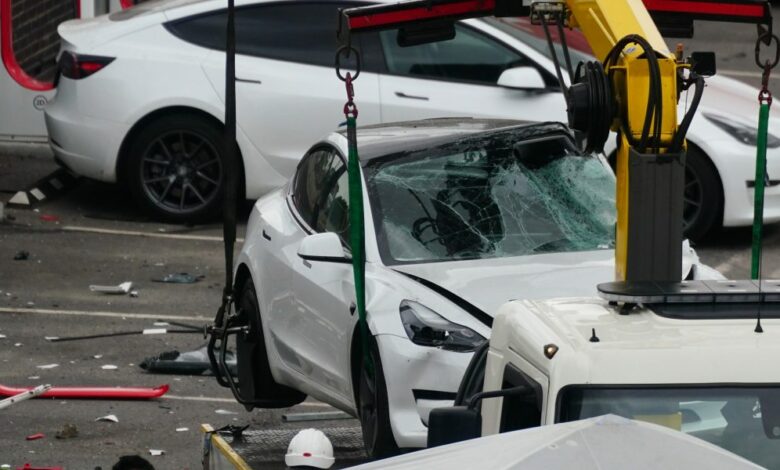EV repair costs are so high that minor crashes can total a car


Electric car sales already are in a funk in key markets around the globe. Challenges finding enough repair technicians threatens to further stifle demand in the UK, where consumer uptake has stagnated for the better part of two years.
A dearth of mechanics trained to handle the most advanced EV fixes is helping to drive up repair costs, according to insurers and repair companies like the AA, which provides roadside assistance across the UK. Add in expenses like long wait times for replacement parts, and underwriters are opting to total cars with relatively benign damage — prematurely consigning electric models to the junk heap.
A seemingly simple crash that damages the battery or the compartment housing it “can cause a complete write-off of the vehicle,” said Marco Distefano, managing director of insurer Axa SA’s UK retail division. “Ultimately, that pushes up the price of insurance.”
Fewer than 10% of the UK’s 236,000 auto mechanics are qualified to work directly on EV batteries or their cases, according to the Institute of the Motor Industry, which provides training and certification. While many technicians can perform less-demanding tasks, the most challenging repairs require extra training, given the complexity of the circuits and risk of electrocution.
“The ante is risen quite a lot because you are dealing with no mistakes really,” Darren Naughton, an AA trainer, said during a visit in Birmingham. “It’s instant death on these systems.”
Drivers are also concerned that a collision is more likely to lead to an EV writeoff, according to UK consultants Thatcham Research. Long lead-times for deliveries and a shortage of functioning charge points are also holding back demand for the environmentally friendly vehicles, it said in a report last year.
With 1 million EVs on the roads already, the crunch is forecast to get worse. Repair shops are starting to train up staff, but the UK will still be short by about 30,000 qualified technicians by 2035, when a ban on the sale of new combustion vehicles takes effect, according to IMI estimates.
UK sales of battery-electric vehicles have tread water as a share of the market since 2022. They stood at 15% in March, according to the Society of Motor Manufacturers & Traders. Insurance costs are double those of conventional vehicles, Bloomberg reported in January.
Other factors are helping to skew insurers’ once-straightforward decision on whether to repair or replace a car after an accident. Replacement parts are expensive and take longer to arrive from abroad, adding to downtimes for damaged cars and driving up ancillary costs like car rentals.
When the settlement cost approaches or exceeds the value of the vehicle, the insurer will typically take ownership and either scrap it, break it up for parts, or fix and sell it again if the damage is minimal. UK auto dismantler Synetiq has seen a 55% increase in electric car and van disposals over the past year, it said on its its website. It’s set up an operation to recycle expensive battery materials like lithium and nickel.
High repair costs have long dogged EV makers like Tesla Inc., which lacks the dedicated service network of traditional car manufacturers. Hertz Global Holdings Inc., the US rental-car giant, had to junk Teslas when the cost of fixing easily damaged items like radar assemblies sent repair costs through the roof.
Many of the cars being disassembled or crushed in the UK are fixable, according to Lee Houston, EV technical liaison engineer at the AA. As soon as a battery is dented or marked, “it’s a replacement, which will write the car off” at a cost of £15,000 ($19,000) to £20,000, he said.
Other countries have dealt more effectively with the challenges. In Germany, Europe’s largest car market, the lack of skilled workers is less pronounced than in the UK, according to ADAC, the country’s prime supplier of roadside services.
There’s no issue with EV competence in Norway, where 82% of new cars sold last year were electric, said a spokesman for the Norwegian Automobile Federation, though there is a general shortage of mechanics. In Sweden, mechanics’ EV skills are improving fast, said the Swedish Association for Motor Retail Trades and Repairs.
While the added training required to fix an EV battery doesn’t come cheap, the UK’s challenges aren’t insurmountable. Axa UK put the cost at about £2,500 per mechanic for four days of training — doable for larger chains, though smaller shops will need to decide whether to take the plunge.
At Kwik Fit, one of the largest UK car-servicing groups, just 15 out of about 1,500 technicians meet the Level 3 or Level 4 standard required to repair EV battery cells and modules.
Ben Boot, Kwik Fit’s head of development for service, maintenance and repair, expects the job to eventually attract a wider pool of candidates more comfortable with diagnostics and electrical engineering concepts.
“There’s still an element of the fear of the unknown when it comes to battery repair and getting into the repair of individual cells and modules,” Boot said. Once there are more fully trained EV technicians, “repair rather than replace becomes a more viable proposition.”
Source link




